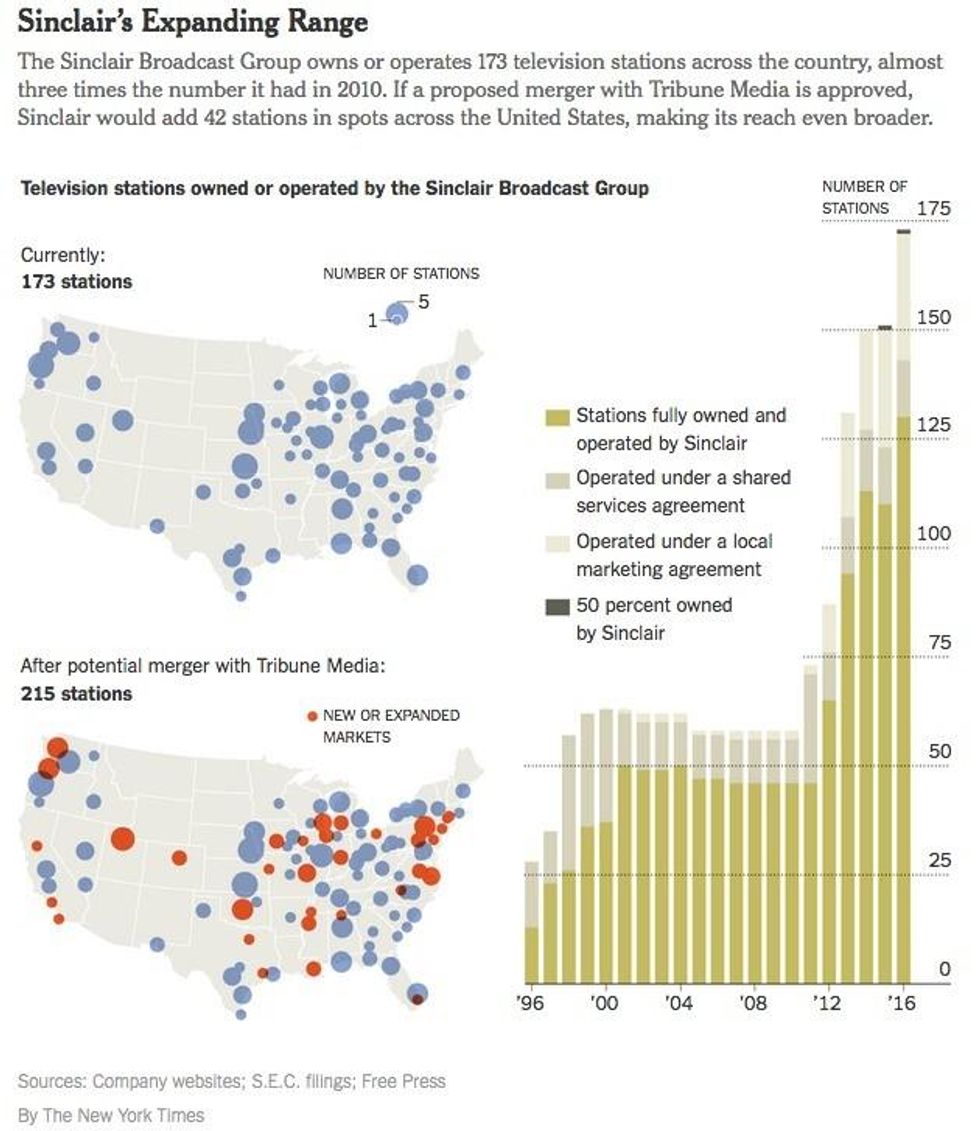As the New York Times published a scathing new report detailing how Sinclair Broadcast Group "is ridding itself of regulation" on Monday, three ranking Democrats on relevant House of Representatives committees sent a letter to the Federal Communications Commission (FCC) chairman about his agency's alleged "preferential treatment" of the conservative-leaning local television behemoth.
In the 12-page letter (pdf) sent to FCC Chairman Ajit Pai, a Republican appointed by President Donald Trump, Reps. Diana DeGette (D-Colo.), Mike Doyle (D-Pa.), and Frank Pallone Jr. (D-N.J.) rely on recent news reports to outline four ways in which the FCC, under the Trump administration, "has taken a series of swift actions that have benefitted Sinclair." The Democratic lawmakers outline reports that the FCC:
- Reinstated an outdated "UHF Discount" that would enable Sinclair to bypass a FCC restriction that prohibits one company from owning enough stations to reach 39 percent of the nation's audience--a decision that critics say "directly paved the way for Sinclair's proposed $3.9 billion deal to purchase Tribune Media, which is awaiting FCC approval," according to The Hill;
- Established an expedited timeline to review Sinclair's proposed merger with Tribune, which Motherboard reported "would create a national broadcasting juggernaut with more than 230 stations reaching 72 percent of households across the country";
- Allowed Sinclair to spend millions to purchase stations from Bonten Media Group shortly after revoking 2014 guidance that would have required the agency to scrutinize the deal;
- Has taken steps to allow television broadcasters, including Sinclair, to use the Next Gen TV transmission standard "with very few consumer protections in place."
The legislators--who serve on the House Commerce Committee, the technology and communications subcommittee, and the oversight and investigations subcommittee--also presented a bulleted list of interactions between Pai and Sinclair, as well as the Trump administration and Sinclair, that they said seem to "suggest a favorable relationship."
Among these allegations are that Pai met with Sinclair's then-CEO David Smith while attending a conference for the company's general managers in November; Pai met with Smith as well as new Sinclair CEO Chris Ripley in January; Sinclair "struck a deal" with the Trump campaign, exchanging access to the then-candidate for better coverage; and former Trump official Boris Epshteyn's on-air political commentary segments, which have been called "propaganda" by critics, are sent to Sinclair stations as "must-run" programming.
"We hope this letter will serve as an opportunity to respond to reports suggesting that you have failed to exercise adequate independence as FCC Chairman and that may have resulted in the agency giving unusual and possibly preferential treatment to Sinclair," the Democrats wrote to Pai, requesting a response by August 28--the day before the final deadline for the public to file comments with the FCC regarding Sinclair's proposed merger with Tribune.
The Democratic lawmakers' allegations, which are sourced with dozens of footnotes, are further bolstered by reporting published Monday by the New York Times that details Pai's alleged "deregulatory blitz, enacting or proposing a wish list of fundamental policy changes advocated by Mr. Smith and his company."
Relying on hundreds of pages of emails and other documents that the Times accessed via the Freedom of Information Act, the article describes a "rush of regulatory actions [that] has been carefully aligned with Sinclair's business objectives," including regulatory rollback that critics say "undermines the heart of the FCC mission to protect diversity, competition and local control in broadcast media."
The Times article also outlines Pai's cozy history with the company and quotes Ripley as saying on a phone call with Sinclair investors in February: "We do expect this new FCC to tackle the ownership rules. We're very optimistic about this new FCC and the leadership of Ajit Pai."
If the Tribune merger is approved by the FCC under Pai and the Trump administration, Sinclair would add another 42 stations to its already vast reach, as the Times mapped below.
The Times report also details the histories of the company and Pai, noting other recent deregulatory actions by the FCC chairman that have provoked intense criticism: "Mr. Pai also froze a program for broadband subsidies for low-income families and began a rollback of net neutrality rules that ensured Internet traffic was equally available to all consumers, acting on regulatory issues that will reshape other multibillion-dollar businesses under his watch."
As Common Dreams has previously reported, concerns over Pai's opposition to net neutrality protections have motivated Open Internet and free speech advocates, as well as Democrat lawmakers, to sound alarms and organize nationwide protests.


